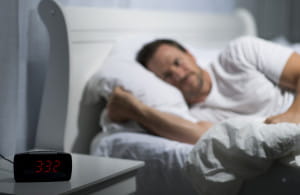Six tips to help you beat insomnia

You’ve got a big presentation this week, and you can’t sleep because you’re too worried about it.
It’s 4:00 in the morning and you’re wide awake. Your alarm goes off in two hours.
We’ve all been caught in situations like these, trying to fall back asleep in the middle of the night without any luck. And, unfortunately, counting sheep is rarely a successful solution.
Below, Robert Satriale, MD, pulmonologist and sleep specialist at Riddle Hospital, offers practical tips to help you fall asleep more quickly the next time you find yourself awake in the middle of the night.
Take time to unwind
The best way to help yourself to stay asleep at night? Take time before bed to unwind. Although it can be hard to unplug from all your electronic devices a full hour before bedtime, try to turn off the television an hour before bed, and your cell phone and tablets a half hour or 20 minutes before bed.
In the time before you fall asleep, do something relaxing, instead of spending time in front of the screen. Read a book, have a cup of tea, take a warm bath or shower, or spend time with your partner or family talking or playing a game. Allowing yourself time to relax before bed can help prevent middle-of-the-night wake-ups.
Don’t go to sleep too early
If your sleep quality is suffering, it’s probably better to turn in earlier, right? Wrong.
“Most people believe they should go to bed early if they’re sleeping poorly, in an effort to get more sleep. Unfortunately, this will likely worsen sleep quality, as the brain’s circadian rhythm will still prompt an early wake-up, and the increase in sleep will only make it harder to go back to sleep,” explains Dr. Satriale.
Instead of going to bed too early, Dr. Satriale recommends going to bed later in the day to drive continuous, and quality, sleep.
“Remember, the body generally needs seven to eight hours of sleep. Spending nine to 10 hours in bed guarantees there will be about two to three hours of lying there, struggling to sleep. Those hours will only reinforce the fact that your bed is a difficult place to sleep,” he says.
Practice breathing exercises
During yoga, participants are encouraged to take deep breaths and envision those breaths entering and leaving their bodies. When you’re having trouble falling asleep, a similar practice can be helpful.
“Breathing techniques can be very helpful when you’re trying to fall back asleep,” says Dr. Satriale. “Focusing solely on your breathing can help take your mind off of so many other distractions.”
Next time you’re tossing and turning, focus your mind on the inhaling and exhaling of your breath, the rising and falling of your chest and abdomen with each breath, and the release of your distracting thoughts with each breath. Whenever you find your mind wandering, redirect your focus back to your breath.
Write it down
It’s common for thoughts of a work presentation, long to-do list, looming deadline, or emotional stress to keep you awake at night. But often, there’s little you can do to change the situation—or the outcome—in the middle of the night.
Keep a pad of paper and a pen on a table next to your bed so you can be prepared for the next time your mind is racing with thoughts like these. Instead of letting your mind get carried away, right down the steps you’ll take in the morning to address the situation. Making a list of steps you’ll take to be proactive and prevent additional stress can often be enough to make you feel calmer for the time being.
Hide the clock
It’s 2:00 in the morning and your alarm is set to go off in four hours. Now three and a half. Now three…
“Watching the time tick away as you’re trying to fall asleep can create anxiety and make it even more difficult to fall back asleep,” says Dr. Satriale. “In addition to worrying about not sleeping, you’re now worrying about how much time you have left to sleep.”
Next time a bout of insomnia strikes, turn your clock around and resist the temptation to check the time. Any amount of sleep—whether it’s an hour or four hours—is better than none at all, so focus on falling back asleep, rather than how much time is left until the alarm.
Seek a change of scenery
When you’ve been awake for awhile, sometimes it can be beneficial to move to a different area of the house to try and fall asleep.
“Although you’re best chances for restful sleep are in a bed, some people choose to go to a living room or a relaxing room in the house when they can’t sleep,” explains Dr. Satriale. “It might be where they typically go to read a book, or watch TV, but it’s where they feel relaxed.”
When you can’t sleep, try sleeping in another bedroom or relaxing room in your house. Even if it means leaving your room for a few minutes to read and returning later, taking a break from your environment can help.
Still struggling to fall or stay asleep? Main Line Health offers several sleep center locations to provide you with diagnosis and treatment for a variety of sleep disorders. To schedule an appointment with a specialist at Main Line Health, call 1.866.CALL.MLH (225.5654).
 Content you want, delivered to your inbox
Content you want, delivered to your inbox
Want to get the latest health and wellness articles delivered right to your inbox?
Subscribe to the Well Ahead Newsletter.
